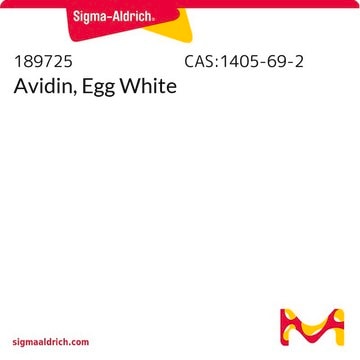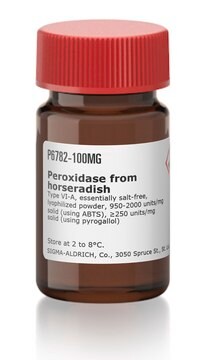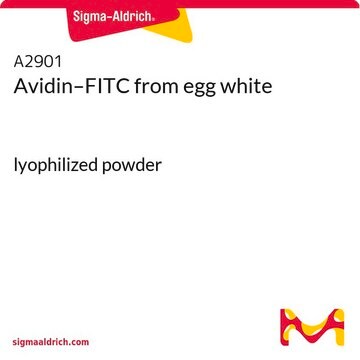A3151
Avidin–Peroxidase
lyophilized powder
Synonym(s):
Avidin-POD
Sign Into View Organizational & Contract Pricing
All Photos(1)
About This Item
Recommended Products
biological source
avidin from egg white
enzyme from horseradish
Quality Level
conjugate
peroxidase conjugate
form
lyophilized powder
composition
Protein, ≥70% E1%/280
extent of labeling
0.7-2.0 mol peroxidase per mol avidin
technique(s)
direct ELISA: 1:50,000
solubility
H2O: soluble 1 mg/mL
PBS: soluble
storage temp.
−20°C
General description
Avidin is homotetrameric protein (68kDa) that is obtained from egg whites. This egg protein binds strongly to biotin. Thus, avidin-biotin association has been utilized in immunoassays to detect the localization of antigens in tissues. The use of avidin-biotin immunoassay enhances the sensitivity of the technique and facilitates the detection of antigens in low quantities.
Application
Avidin-Peroxidase has been used for detecting anti-5-bromodeoxyuridine (anti-BrdU) binding and OVA-IgG1.
To detect Ga1-deficient IgA1 antibodies in mouse serum, ELISA assays were performed using sera which was incubated with biotinylated HAA, which binds IgA1, in 96-well plates. HRP-conjugated avidin was then incubated with the sera for 40 minutes at 37 degrees.
Physical form
Lyophilized powder containing citrate buffer.
Preparation Note
Labeled with Type VI peroxidase. Coupled by a modification of the method of Sullivan, M.J., et al., FEBS Lett., 95, 311 (1978).
Disclaimer
Unless otherwise stated in our catalog or other company documentation accompanying the product(s), our products are intended for research use only and are not to be used for any other purpose, which includes but is not limited to, unauthorized commercial uses, in vitro diagnostic uses, ex vivo or in vivo therapeutic uses or any type of consumption or application to humans or animals.
Signal Word
Danger
Hazard Statements
Precautionary Statements
Hazard Classifications
Resp. Sens. 1
Storage Class Code
11 - Combustible Solids
WGK
WGK 1
Flash Point(F)
Not applicable
Flash Point(C)
Not applicable
Personal Protective Equipment
dust mask type N95 (US), Eyeshields, Gloves
Certificates of Analysis (COA)
Search for Certificates of Analysis (COA) by entering the products Lot/Batch Number. Lot and Batch Numbers can be found on a product’s label following the words ‘Lot’ or ‘Batch’.
Already Own This Product?
Find documentation for the products that you have recently purchased in the Document Library.
Customers Also Viewed
P Birner et al.
The American journal of pathology, 158(6), 1991-1996 (2001-06-08)
Monoclonal antibody MIB-1 is a reliable tool for determining proliferating cells in human tissues, but does not react with the homologous mouse antigen and is therefore useless in experimental pathology using mice as model systems. Standard method for assessment of
Luigia Pace et al.
Journal of immunology (Baltimore, Md. : 1950), 184(11), 5969-5979 (2010-04-30)
Type I IFNs are central to a vast array of immunological functions. Their early induction in innate immune responses provides one of the most important priming mechanisms for the subsequent establishment of adaptive immunity. The outcome is either promotion or
S de la Barrera et al.
Clinical and experimental immunology, 138(1), 128-138 (2004-09-18)
Activation of T cells requires both TCR-specific ligation and costimulation through accessory molecules during T cell priming. IFNgamma is a key cytokine responsible for macrophage activation during Mycobacterium tuberculosis (Mtb) infection while IL-10 is associated with suppression of cell mediated
Peter Patrikios et al.
Brain : a journal of neurology, 129(Pt 12), 3165-3172 (2006-08-22)
Although spontaneous remyelination does occur in multiple sclerosis lesions, its extent within the global population with this disease is presently unknown. We have systematically analysed the incidence and distribution of completely remyelinated lesions (so-called shadow plaques) or partially remyelinated lesions
Gautam N Shenoy et al.
Clinical & translational immunology, 10(2), e1246-e1246 (2021-02-09)
With a rapidly growing list of candidate immune-based cancer therapeutics, there is a critical need to generate highly reliable animal models to preclinically evaluate the efficacy of emerging immune-based therapies, facilitating successful clinical translation. Our aim was to design and
Our team of scientists has experience in all areas of research including Life Science, Material Science, Chemical Synthesis, Chromatography, Analytical and many others.
Contact Technical Service















